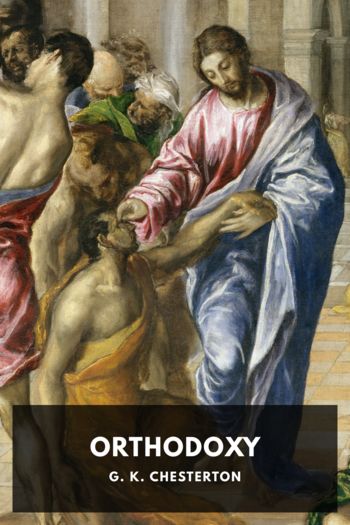Orthodoxy - G. K. Chesterton (literature books to read .txt) 📗

- Author: G. K. Chesterton
Book online «Orthodoxy - G. K. Chesterton (literature books to read .txt) 📗». Author G. K. Chesterton
The modern world as I found it was solid for modern Calvinism, for the necessity of things being as they are. But when I came to ask them I found they had really no proof of this unavoidable repetition in things except the fact that the things were repeated. Now, the mere repetition made the things to me rather more weird than more rational. It was as if, having seen a curiously shaped nose in the street and dismissed it as an accident, I had then seen six other noses of the same astonishing shape. I should have fancied for a moment that it must be some local secret society. So one elephant having a trunk was odd; but all elephants having trunks looked like a plot. I speak here only of an emotion, and of an emotion at once stubborn and subtle. But the repetition in Nature seemed sometimes to be an excited repetition, like that of an angry schoolmaster saying the same thing over and over again. The grass seemed signalling to me with all its fingers at once; the crowded stars seemed bent upon being understood. The sun would make me see him if he rose a thousand times. The recurrences of the universe rose to the maddening rhythm of an incantation, and I began to see an idea.
All the towering materialism which dominates the modern mind rests ultimately upon one assumption; a false assumption. It is supposed that if a thing goes on repeating itself it is probably dead; a piece of clockwork. People feel that if the universe was personal it would vary; if the sun were alive it would dance. This is a fallacy even in relation to known fact. For the variation in human affairs is generally brought into them, not by life, but by death; by the dying down or breaking off of their strength or desire. A man varies his movements because of some slight element of failure or fatigue. He gets into an omnibus because he is tired of walking; or he walks because he is tired of sitting still. But if his life and joy were so gigantic that he never tired of going to Islington, he might go to Islington as regularly as the Thames goes to Sheerness. The very speed and ecstasy of his life would have the stillness of death. The sun rises every morning. I do not rise every morning; but the variation is due not to my activity, but to my inaction. Now, to put the matter in a popular phrase, it might be true that the sun rises regularly because he never gets tired of rising. His routine might be due, not to a lifelessness, but to a rush of life. The thing I mean can be seen, for instance, in children, when they find some game or joke that they specially enjoy. A child kicks his legs rhythmically through excess, not absence, of life. Because children have abounding vitality, because they are in spirit fierce and free, therefore they want things repeated and unchanged. They always say, “Do it again”; and the grownup person does it again until he is nearly dead. For grownup people are not strong enough to exult in monotony. But perhaps God is strong enough to exult in monotony. It is possible that God says every morning, “Do it again” to the sun; and every evening, “Do it again” to the moon. It may not be automatic necessity that makes all daisies alike; it may be that God makes every daisy separately, but has never got tired of making them. It may be that He has the eternal appetite of infancy; for we have sinned and grown old, and our Father is younger than we. The repetition in Nature may not be a mere recurrence; it may be a theatrical encore. Heaven may encore the bird who laid an egg. If the human being conceives and brings forth a human child instead of bringing forth a fish, or a bat, or a griffin, the reason may not be that we are fixed in an animal fate without life or purpose. It may be that our little tragedy has touched the gods, that they admire it from their starry galleries, and that at the end of every human drama man is called again and again before the curtain. Repetition may go on for millions of years, by mere choice, and at any instant it may stop. Man may stand on the earth generation after generation, and yet each birth be his positively last appearance.
This was my first conviction; made by the shock of my childish emotions meeting the modern creed in mid-career. I had always vaguely felt facts to be miracles in the sense that they are wonderful: now I began to think them miracles in the stricter sense that they were wilful. I mean that they were, or might be, repeated exercises of some will. In short, I had always believed that the world involved magic: now I thought that perhaps it involved a magician. And this pointed a profound emotion always





Comments (0)